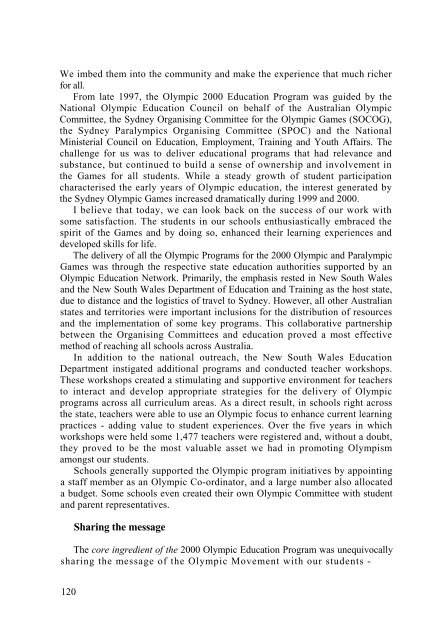download - IOA
download - IOA
download - IOA
You also want an ePaper? Increase the reach of your titles
YUMPU automatically turns print PDFs into web optimized ePapers that Google loves.
We imbed them into the community and make the experience that much richer<br />
for all.<br />
From late 1997, the Olympic 2000 Education Program was guided by the<br />
National Olympic Education Council on behalf of the Australian Olympic<br />
Committee, the Sydney Organising Committee for the Olympic Games (SOCOG),<br />
the Sydney Paralympics Organising Committee (SPOC) and the National<br />
Ministerial Council on Education, Employment, Training and Youth Affairs. The<br />
challenge for us was to deliver educational programs that had relevance and<br />
substance, but continued to build a sense of ownership and involvement in<br />
the Games for all students. While a steady growth of student participation<br />
characterised the early years of Olympic education, the interest generated by<br />
the Sydney Olympic Games increased dramatically during 1999 and 2000.<br />
I believe that today, we can look back on the success of our work with<br />
some satisfaction. The students in our schools enthusiastically embraced the<br />
spirit of the Games and by doing so, enhanced their learning experiences and<br />
developed skills for life.<br />
The delivery of all the Olympic Programs for the 2000 Olympic and Paralympic<br />
Games was through the respective state education authorities supported by an<br />
Olympic Education Network. Primarily, the emphasis rested in New South Wales<br />
and the New South Wales Department of Education and Training as the host state,<br />
due to distance and the logistics of travel to Sydney. However, all other Australian<br />
states and territories were important inclusions for the distribution of resources<br />
and the implementation of some key programs. This collaborative partnership<br />
between the Organising Committees and education proved a most effective<br />
method of reaching all schools across Australia.<br />
In addition to the national outreach, the New South Wales Education<br />
Department instigated additional programs and conducted teacher workshops.<br />
These workshops created a stimulating and supportive environment for teachers<br />
to interact and develop appropriate strategies for the delivery of Olympic<br />
programs across all curriculum areas. As a direct result, in schools right across<br />
the state, teachers were able to use an Olympic focus to enhance current learning<br />
practices - adding value to student experiences. Over the five years in which<br />
workshops were held some 1,477 teachers were registered and, without a doubt,<br />
they proved to be the most valuable asset we had in promoting Olympism<br />
amongst our students.<br />
Schools generally supported the Olympic program initiatives by appointing<br />
a staff member as an Olympic Co-ordinator, and a large number also allocated<br />
a budget. Some schools even created their own Olympic Committee with student<br />
and parent representatives.<br />
Sharing the message<br />
The core ingredient of the 2000 Olympic Education Program was unequivocally<br />
sharing the message of the Olympic Movement with our students -<br />
120
















